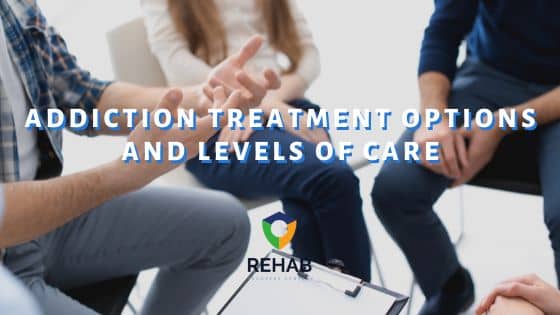Table of Contents
If you or someone you love are one of the millions of people in the United States living with substance abuse, you must seek treatment as soon as possible to avoid the consequences of untreated addiction.
Understanding the levels of care and types of treatment available may help you make informed decisions as you choose where to seek treatment.
An Overview of the Levels of Care in Addiction Treatment
There are five primary levels of care in addiction treatment. The level of care a person requires depends on their addiction’s length and severity, mental health and medical needs, environmental factors, and other aspects.
Detox
Many people begin substance abuse treatment by completing a medically supervised detox program. During detox, medical and support professionals monitor and treat patients for uncomfortable or dangerous withdrawal symptoms. This allows you to experience a complete detox, which increases the likelihood of long-term success.
Inpatient Treatment
Inpatient or residential treatment is a good option for people who need intensive addiction treatment and round-the-clock care. The goal of an inpatient treatment program is to teach people the skills they need to live life without using drugs and alcohol. People learn these skills by participating in:
- Individual therapy
- Group therapy
- Family therapy
- Medication management
- Education and skill-building practice
Inpatient treatment may be the right option for those who do not have stable housing or who require significant mental health or medical care during treatment.
Partial Hospitalization Programs (PHP)
A partial hospitalization program, also called day treatment or partial care, is often recommended for people who live with a moderate to severe addiction but do not meet the criteria for inpatient treatment. Some people may participate in a PHP after completing inpatient rehab or as an alternative to inpatient treatment.
In a PHP, people participate in several hours of treatment activities, including therapy, education, and medication management, each day. Partial care programs follow an intensive schedule similar to an inpatient program but allow people to return home at the end of the day.
Intensive Outpatient Treatment
Intensive outpatient treatment (IOP) is a good option for people who need an intensive level of care and have a stable living condition. Participation in an IOP lets people practice sobriety in their community while receiving a high level of support.
In this level of care, people follow an intensive schedule of treatments that include group counseling, education, and individual therapy. Instead of living at the facility, they return home in the evening. This makes IOP treatment a good option for people who have family responsibilities, or who want to stay engaged with their support network.
Outpatient Treatment
The goals of outpatient treatment are the same as other levels of care: to help people understand their addiction and teach them the skills they need to avoid relapse in the future. Outpatient rehab is the most flexible of all the levels of care provided in addiction treatment. People in this level of care can often continue to work, attend school, or care for family members.
Participating in outpatient addiction treatment may be a good option for people who are not ready or willing to complete a higher level of care. It is not recommended for those with constant, strong cravings or those who do not have safe, stable housing.
Understanding Different Approaches to Addiction Treatment
People have unique needs, desires, and life experiences that should be reflected in their addiction treatment. For this reason, a variety of treatment programs are available to give people the high-quality care they need while meeting their individual needs. Specialty rehab programs include:
- Faith-based treatment: Treatment is focused on recovering from addiction and re-connecting with God or a higher power
- Substance abuse treatment for veterans: Treatment programs are designed to address addiction and issues related to military services, including PTSD, chronic pain, and re-integration into a community
- Gender-specific treatment: People may prefer to participate in a treatment program designed for one gender
- Holistic rehab: Some may desire a focus on overall wellness while going through rehab, including holistic therapies like yoga, acupuncture, and meditation
- LGBTQ+ addiction treatment: Members of the LGBTQ+ community may benefit from treatment programs tailored to meet their needs and address issues specific to this community
Before committing to a substance abuse treatment program, it is essential to determine that the program uses evidence-based therapies for the majority of their treatment time. This means that people should be engaged in proven therapies, such as individual counseling, addiction education, medication management, family therapy, and support groups most of the time they are in treatment. Holistic treatments, like art therapy, nutrition counseling, mindfulness practices, acupuncture, and yoga should be used only to complement the evidence-based treatment provided in the program.
How to Determine Which Addiction Treatment Options Are Right For You
Addiction treatment is offered at several levels. Addiction specialists adjust the program length and therapies used because addiction is not a single-size-fits-all condition. The length and severity of your addiction will contribute to your treatment plan.
Before beginning treatment, a medical doctor or addiction specialist will assess your needs and recommend a level of care to help you overcome addiction. This evaluation will include questions about your medical and mental health history, previous treatment programs, existing supports, and other aspects of your life that will help them determine what level of care is right for you.
Once you know what level of care is appropriate, you may search for facilities that offer the correct treatment. You may want to consider your particular needs or preferences, such as wanting a faith-based or gender-specific treatment program.
Get Help Now
Reach out to the Rehab Recovery Centers specialists today to learn more about starting a substance abuse treatment program.
Get Help Today
Don’t go through the process of recovery alone. There are people who can help you with the struggle you’re facing. Get in touch with one today.


